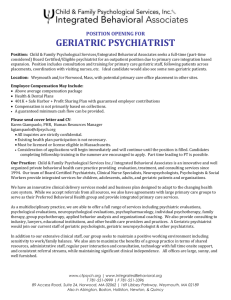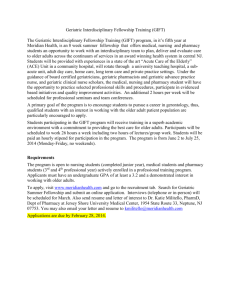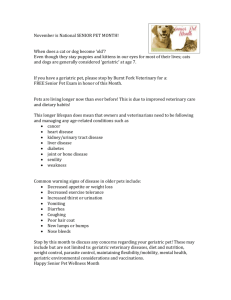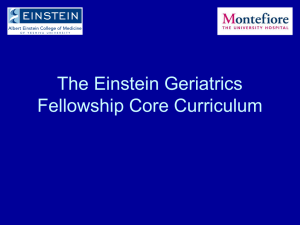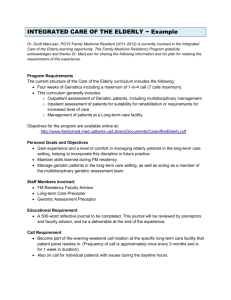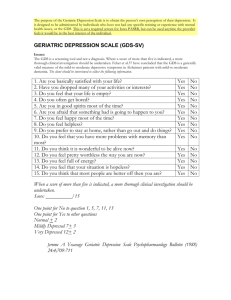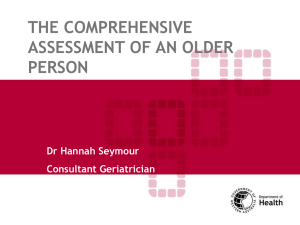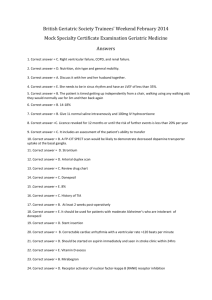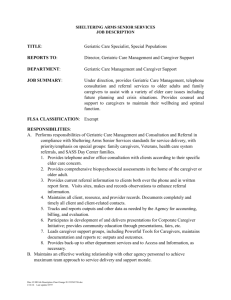Geriatrics
advertisement
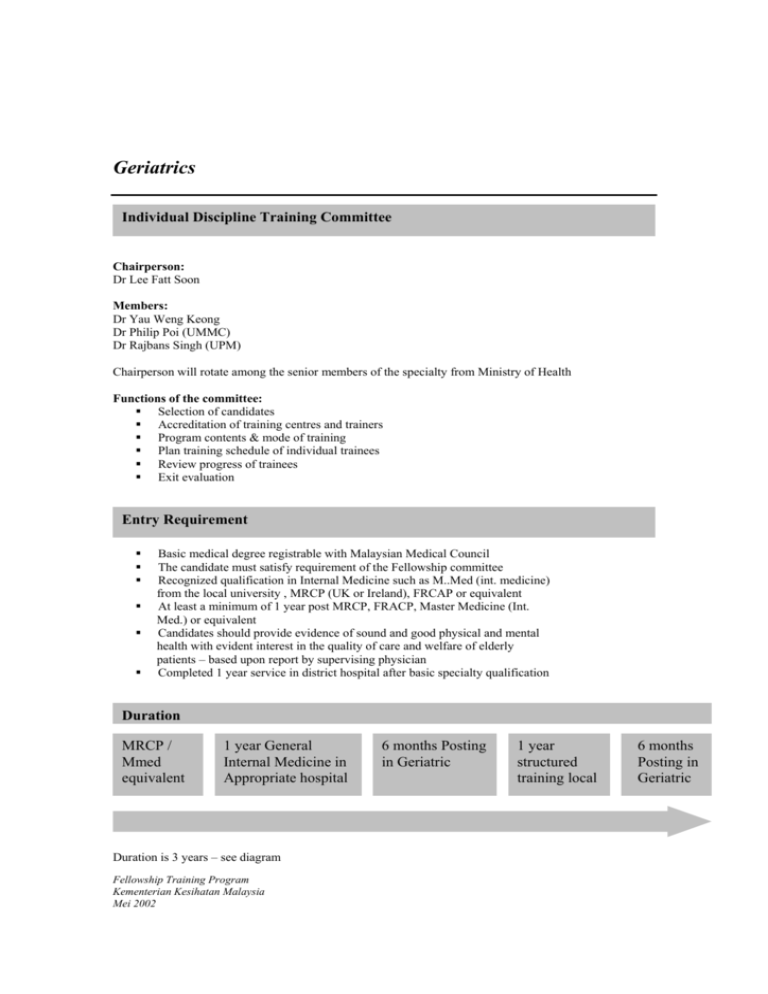
Geriatrics Individual Discipline Training Committee Chairperson: Dr Lee Fatt Soon Members: Dr Yau Weng Keong Dr Philip Poi (UMMC) Dr Rajbans Singh (UPM) Chairperson will rotate among the senior members of the specialty from Ministry of Health Functions of the committee: Selection of candidates Accreditation of training centres and trainers Program contents & mode of training Plan training schedule of individual trainees Review progress of trainees Exit evaluation Entry Requirement Basic medical degree registrable with Malaysian Medical Council The candidate must satisfy requirement of the Fellowship committee Recognized qualification in Internal Medicine such as M..Med (int. medicine) from the local university , MRCP (UK or Ireland), FRCAP or equivalent At least a minimum of 1 year post MRCP, FRACP, Master Medicine (Int. Med.) or equivalent Candidates should provide evidence of sound and good physical and mental health with evident interest in the quality of care and welfare of elderly patients – based upon report by supervising physician Completed 1 year service in district hospital after basic specialty qualification Duration MRCP / Mmed equivalent 1 year General Internal Medicine in Appropriate hospital Duration is 3 years – see diagram Fellowship Training Program Kementerian Kesihatan Malaysia Mei 2002 6 months Posting in Geriatric 1 year structured training local 6 months Posting in Geriatric Training Content and Modalities Post graduate Training Content: UMMC 1 Basic Sciences 2 Clinical teaching and concepts behind Geriatric Medicine • Health Promotion and disease prevention: primary, secondary and tertiary prevention • Core competencies: 1. Ability to take a history 2. Formulate a differential diagnosis 3. Preparing management plan for patients & exposure to the multidisciplinary concept . Posting of 12 months with Geriatric Unit, UMMC, KL 10 MONTHS acute / Rehabilitation in Geriatric Medicine (clinics, ward rounds, tutorials, seminars and journal reviews) which will include liaison with the Orthopedic Unit and Neurology. • 1 month attachment to Rehabilitation unit (in particular, management of pressure sores , contractures) • 1 month attachment at a local or overseas accredited unit should the candidate show exceptional aptitude during training. During this period, the trainee is expected to carry out a research project pertaining to Care of the elderly. Details as in Appendix Training Centers & Trainers Accredited trainers: Prof Philip Poi (UMMC) Accredited training centers: UMMC (Future training centres and trainers planned in KLGH) Trainee commitments 1. 2. 3. 4. The candidate will be required to perform all clinical duties as directed by the supervisor . The candidates must participate in geriatric related CME activities and should attend courses, seminars and lectures They should have an opportunity to function as a teacher to his colleagues in practice, to paramedical staffs and students The candidate should be encouraged to prepare written material in the form of an Article, case report or even original paper to be published in a refereed journal. these case reports are to be presented to and assessed by the candidate ’ supervisor before publication . Fellowship Training Program Kementerian Kesihatan Malaysia Mei 2002 CANDIDATE / TRAINEE ’S ATTITUDE 1. 2. 3. 4. 5. Candidate must be very empathetic to the needs and wants of patients and their families as Geriatric Medicine is a very “ Family and Social ” oriented Subspecialty. This attitude is also very important in helping to understand the nature of the illness, the social and cultural involvement and the need and goals of the patients and families. Also there are a lot of bioethical issues which the families must always be involved. They must also look into psycho-social issue which are important consideration in Geriatric Medicine . Inter-disciplinary Teamwork is an essential component of Geriatric Practice. There is also a lot of overlapping in the role of the different personnel in Geriatric care. Therefore candidates should develop the appropriate attitude to work harmoniously with other allied health care personnel. Candidate should always self reflect on their knowledge, attitude, skills and the importance of continuing medical education in Geriatric Medicine. Ageism and ignorance is major obstruction to progress of Geriatric Medicine, therefore candidate must be willing to share and teach students, trainees from other discipline and allied health care personnel. The candidate should show the initiative required to start geriatric services at state level on their own (in the interest of service). Logbook UMMC Log book (appendix UMMC study journal) Certification Before certification as a Geriatrician, professional reports from trainers will be required and an interview with the Accreditation committee is required. Fellowship Training Program Kementerian Kesihatan Malaysia Mei 2002 APPENDIX Post graduate Training Content: UMMC Basic Sciences Biological of ageing Physiological changes of ageing Consequences of Ageing on Drug metabolism: Pharmacokinetics and dynamic Neuroscience: Age-related CNS changes and degenerative diseases (Alzheimer’s Disease, Parkinson’s Disease, Prion associated diseases) Nutrition Social and behavioural aspects of ageing Demography Ethical and legal issues Clinical teaching and the concepts behind Geriatric Medicine • Health Promotion and disease prevention: primary, secondary, and tertiary prevention • Core competencies which include: Ability to take a history Formulate a differential diagnosis Prepare a management plan for patient with the following: • Multiple medical problems • Functional difficulties • Polypharmacy • Poor Social support • The Giants of Geriatrics (instability, falls incontinence, iatrogenic diseases, dementia and delirium) • Exposure to the multidisciplinary concept: This will include a short attachment to disciplines closely allied to Geriatrics (e.g. Physiotherapy, Occupational Therapy, Chiropody, Rehabilitation Medicine, Social Welfare) and will include site visits to selected nursing homes and day centers. This will ensure that the trainee understands the potential of these services in improving the quality of medical care to the elderly patient. Posting of 12 months with Geriatric unit, UMMC, KL: 10 months of Acute/Rehabilitation in Geriatric Medicine (clinics, ward rounds, tutorials, seminars and journal reviews) which will include liaison with the Orthopaedic Unit and Neurology. • 1 month attachment to Rehabilitation unit (in particular, management of pressure sores, contractures) • 1-month attachment at a local or overseas-accredited unit should the candidate show exceptional aptitude during training. During this period, the trainee is expected to carry out a research project pertaining to Care of the elderly, and will be encouraged to sit for the Diploma of Geriatric Medicine, DGM (UK). The incumbent will base an assessment of the trainee on close supervision and monthly review Geriatrician (Assoc. Prof. Dr Philip Poi). The above study plan will give the trainee a total of 12 months of comprehensive training in Geriatric Medicine with emphasis on Holistic elder care based in the Malaysian setting. The trainee can then go to an overseas unit for a period 3-4 months for further subspecialty (incontinence, memory, falls stroke/neurological rehabilitation, palliative care) exposure. Attachment with Specialty Geriatric Units in UK, Ireland and Singapore can be arranged by the existing links with our Geriatric Division and these Units. Fellowship Training Program Kementerian Kesihatan Malaysia Mei 2002

